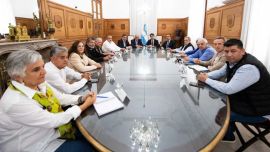With Senate approval of the agreement with the International Monetary Fund under his belt following an unexpectedly comfortable 56-13 vote last Thursday, President Alberto Fernández was poised to launch his “war on inflation” yesterday (even if his choice of battlegrounds had yet to be announced at the time this editorial was being written), an offensive given extra urgency by the unexpectedly hefty inflation rate of 4.7 percent posted for the shortest month of the year on Tuesday. Generals are said to be always fighting the last war in their ongoing conflicts (with a Russian invasion of Ukraine as clumsy as it is brutal perhaps the latest case in point) and President Fernández has given little indication of departing from this syndrome in his strategy against inflation, according to the general expectations – let us hope for some pleasant surprise when he announces his tools. Not only is a “war” against inflation a tasteless choice of words in the current global context but also offers little promise of success if measured by the Kremlin’s frustrations on the steppes of Ukraine.
If a two-front conflict was the main challenge facing German ambitions in both world wars of the past century, President Fernández will be fighting his battles on three fronts – his own understanding of the IMF agreement is one thing, that of the Kirchnerite wing of his coalition quite another and reality (now but especially in the near future) another still. It might be argued that the feeble resistance presented by that wing to parliamentary approval of the agreement (mustering just 28 deputies and 13 senators within Frente de Todos) strengthens the presidential leadership, exposing Vice-President Cristina Fernández de Kirchner as something of a paper tiger (or tigress) even within her own Senate bastion, but this strength is also a weakness – President Fernández is now freer to deploy the arsenal of orthodox Peronism without Kirchnerite obstructionism as an excuse and that arsenal looks sadly wanting.
Meanwhile Economy Minister Martín Guzmán is the victim of his own success – with the IMF agreement out of the way, he is now out of his comfort zone against a spiralling inflation with a limited scope and a faltering presidential credibility to back him up, while various replacements are already being lined up. Neither Kirchnerism nor the Juntos por el Cambio opposition are offering an alternative plan, thus leaving Fernández and Guzmán in a not so splendid isolation to face the music and finding little consolation in Cristina painting herself into an even deeper isolation, as underlined by the attack on her Senate office early this week – this both confirmed her autistic tendencies in personalising the vandalism to her own office instead of deploring the wider institutional outrage of an attack on Congress while showing the strength of the far left challenge to a ruling coalition increasingly seen as pseudo-progressive or even conservative in defending its acquired privileges, even and especially its Kirchnerite wing.
But the main problem is the IMF agreement looking stillborn following last-minute approval in a changing world. Soaring global fuel prices from Vladimir Putin’s disruptive invasion complicate various fronts – energy purchases abroad crowd out the imports needed by other sectors, thus almost halving the growth forecasts for this year, the accumulation of Central Bank reserves becomes a non-starter and the higher fuel prices menace any fiscal deficit reduction by enforcing more subsidies. A sure road to inflation – not so much because of the deficit (if ever there was a country without deficit financing, there surely can be none after the coronavirus pandemic) as because of the monetary means of funding it. While other countries can borrow both at home and abroad, Argentina is confined to a helpless Central Bank to keep the Treasury ticking.
So what weapons did President Fernández announce yesterday for his war on inflation? The contradictory combo of export bans while upping export duties (where do the latter come from if sales abroad are banned)? A decade-long wealth tax as proposed by Córdoba Kirchnerite Pablo Carro? Or will he return to the blame game taking aim against the business appetite for profit (which is timeless and universal but only inflationary in Argentina). Shock tactics? The least likely seems any serious correction of monetary policy but the reader should know what he said by the time this newspaper reaches the table.


















Comments